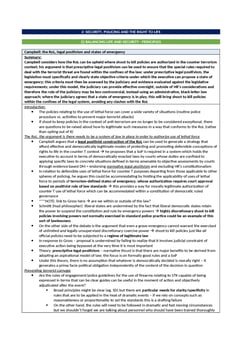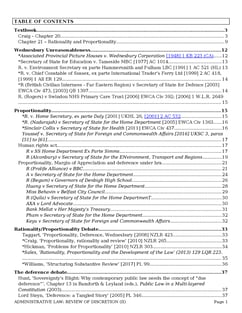R v Home Sec, ex parte Simms [1999] 3 All ER 400
Judgement for the case R v Home Sec, ex parte Simms
Table Of Contents
KEY POINTS
Lord Hoffman:
Fundamental rights cannot be overridden by general or ambiguous words. This is because there is too great a risk that the full implications of their unqualified meaning may have passed unnoticed in the democratic process. In the absence of express language or necessary implication to the contrary, the courts therefore presume that even the most general words were intended to be subject to the basic rights of the individual.
This case established the legal principle known as the "principle of legality” which asserts that fundamental rights recognized under common law cannot be disregarded or set aside by vague or broad language used in Acts of Parliament.
FACTS
Two prisoners, both serving life sentences for murder, sought leave to appeal against their convictions, which was denied by the Court of Appeal. They maintained their innocence and wished to have interviews with journalists who had shown interest in their cases. However, the Governors of the prisons would only permit these interviews if the journalists agreed not to publish any part of them, following the Home Secretary's policy.
The prisoners initiated a judicial review of the decisions that denied them the right to conduct these oral interviews. They argued that their right to free speech, within a specific context, was being infringed upon. They claimed that allowing these interviews was crucial for further investigating the safety of their convictions and for presenting their cases in the media to seek reconsideration.
In the absence of legal representation after the dismissal of their appeals, the prisoners aimed to enlist journalists as investigative allies in their pursuit of justice and a potential reference of their cases to the Court of Appeal (Criminal Division).
JUDGEMENT
Appeal allowed.
COMMENTARY
The case sets a strong precedent for courts to presume that, in the absence of explicit language or clear indications to the contrary, the legislature intended that even the most general wording should be subject to the fundamental rights of individuals.
It emphasizes the importance of safeguarding fundamental rights and ensuring that they are not inadvertently compromised by vaguely worded legal provisions.
ORIGINAL ANALYSIS
Some journalists believed that the prisoners were wrongly convicted and wanted to interview them to publish a story on their conviction. The Secretary of State imposed a ban on journalists interviewing prisoners except insofar as they agreed not to use the information professionally. The prisoners argued that the restriction infringed their right of free speech.
HL held that this was an infringement of the prisoners’ rights of free speech.
-
Any legislation affecting fundamental human rights was presumed to be subject to those rights (presumed parliamentary intention), unless explicitly stating that it was intended to breach those rights.
Therefore the ban made by the Secretary of State, under legislation which did not explicitly permit an interference with freedom of speech, was unlawful.
Lord Hoffmann
Fundamental rights cannot be overridden by general or ambiguous words. This is because there is too great a risk that the full implications of their unqualified meaning may have passed unnoticed in the democratic process.
In the absence of express language or necessary implication to the contrary, the courts therefore presume that even the most general words were intended to be subject to the basic rights of the individual.
He says that s.3 of HRA will give legislative effect to the “legality principle” i.e. that statutes not explicitly derogating from human rights will be presumed to be subject to them.
For Further Study on R v Home Sec, ex parte Simms

A collection of the best BCL notes the director of Oxbridge Notes (an O...
Need instant answers? Our AI exam tutor is here to help.
Ask questions 🙋 Get answers 📔 It's simple 👁️👄👁️
Our AI is educated by the highest scoring students across all subjects and schools. Join hundreds of your peers today.
Get StartedSimilar Cases
Related Product Samples
These product samples contain the same concepts we cover in this case.

 Since 2010, Oxbridge Notes has been a trusted education marketplace, supplying high-quality materials from top achievers at universities like Oxford, Cambridge, LSE, Harvard, and Yale.
Since 2010, Oxbridge Notes has been a trusted education marketplace, supplying high-quality materials from top achievers at universities like Oxford, Cambridge, LSE, Harvard, and Yale.